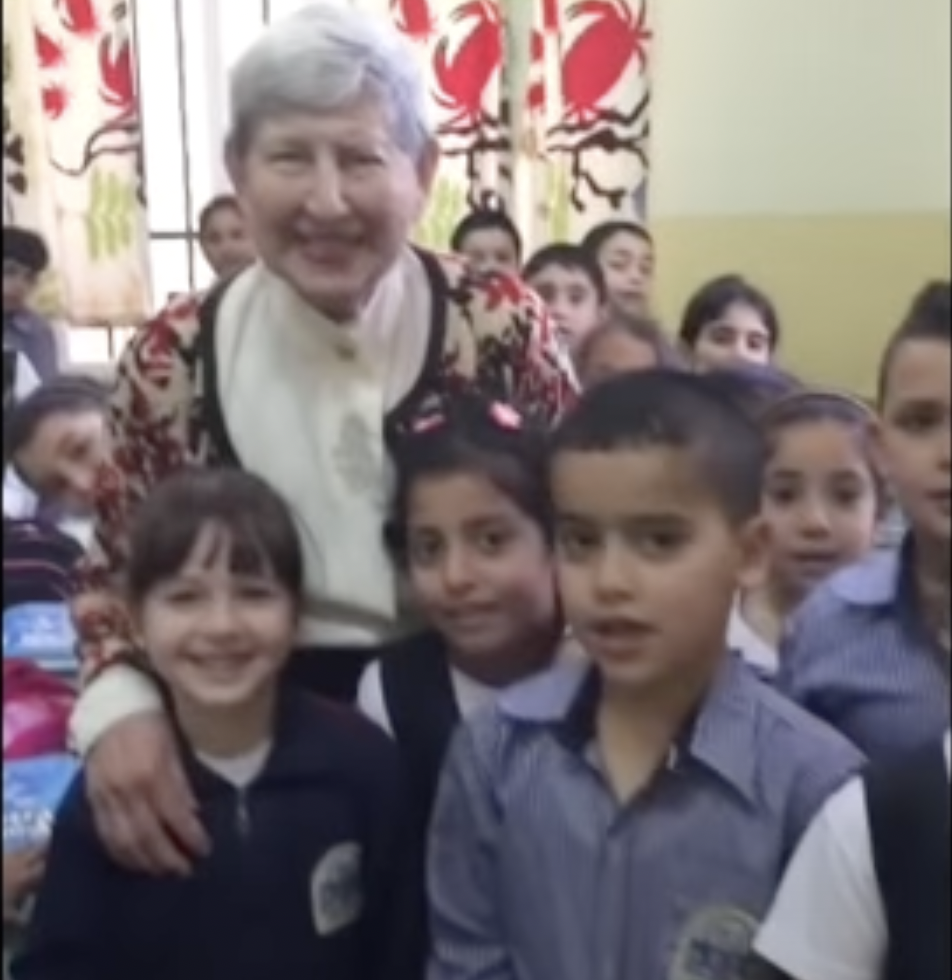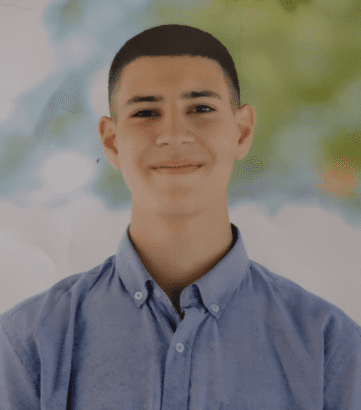Israeli police burst into his home, broke his nose and a tooth after he refused to undress in their presence, then they dragged him by force, bound and blindfolded, to their van…
After 41 days of beatings in an Israeli prison about his alleged role in a stone-throwing incident, 16-year-old Shadi Khoury is finally released to house arrest
His mother is concerned that his adolescence has been lost forever
His family had to break their usual tradition of visiting his grandmother on Christmas in Bethlehem and attending Christmas mass – because Shadi is under house arrest
By Gideon Levy and Alex Levac, reposted from the Israeli newspaper Ha’aretz, Dec. 24, 2022
They would call him “the Christian” to insult him. They would repeatedly beat and humiliate him in jail. In the course of his abduction at the break of dawn from his East Jerusalem home, the black-clad police officers beat him until he bled. They broke his nose and a tooth, after he refused to undress in their presence. Then they dragged him by force, bound and blindfolded, to their van.
When we first arrived at his home, the day after his arrest, the floor of the attractively appointed house was still bloodstained, and his mother, who had seen her son pummeled in front of her eyes, was sobbing and broken.Two months have elapsed since then and Shadi Khoury, an 11th grader at the Quaker Friends School in Ramallah and a resident of the neighborhood of Beit Hanina, was home again, helping his parents decorate their house for Christmas. Everything looked even more beautiful than during our prior visit. Europe on the outskirts of Ramallah.
The Christmas tree was glittering with a panoply of color, along with the other sparkling decorations in every corner of the spacious living room, reflecting the glow and warmth of the holiday. There were decorated ginger cookies and a marzipan Christmas cake on hand, along with fine French wine. All that was missing was snow on the windows. Shadi had returned home.
Now he’s under house arrest. For its part, the State Prosecutor’s Office had gone all the way to the Supreme Court in an unsuccessful bid to prevent his release. But on November 27, after 41 days of abuse, incarceration and interrogations, the teenager finally returned home to a joyful welcome. But when we visited last Sunday, we saw a youth who was restrained and didn’t seem to feel like smiling.
Shadi is a tall, strong and impressive kid, who like the rest of his family, speaks fine English. He had endured a difficult experience and its signs can still be seen on him. It was an experience he never thought he would face. Nor did his parents ever anticipate it.
His mother, Rania, is the director of the Yabous Cultural Center in East Jerusalem. His father, Suhail, is a musician, composer and director of the Edward Said Palestinian National Conservatory of Music in East Jerusalem.
Shadi’s 91-year-old aunt, Lora Khoury, who lives nearby in her own home, on Engineer Khoury Street, named after a family patriarch, is a loyal reader of Haaretz in English. (At one time, she wrote a furious letter to former British Prime Minister Tony Blair for doing nothing to bring about the end of the occupation. Do I sound aggressive and angry? That’s exactly what I’m feeling – she ended her letter to Blair.)
Anyway, it was Lora Khoury who had called us the morning of Shadi’s arrest, on October 18. She had heard his screams from her house. “They came to arrest him, so why beat him?” she asked us at the time. “What army and what police have you created for yourselves?”
This week Shadi unhesitatingly, and fearlessly, recapped in detail what he experienced in an Israeli prison. There were many moments when he didn’t act like a 16-year-old youth. Instead, he seemed to be a level-headed, albeit scarred adult. His mother is concerned that his adolescence has been lost forever.
On Sunday this week, the two were of different minds. She was rooting for Argentina in the World Cup finals, while he was a fan of France. Suhail was rooting for both sides.
That same evening about 40 relatives came by to set up the family’s Christmas tree and decorate the house. On Christmas Day, there will be that same number of people around the holiday table. This year, however, they will have to break their usual tradition of visiting Rania’s mother on Christmas in Bethlehem and they won’t attend Christmas mass – because Shadi is under house arrest.
Israeli police showed up at the family’s home on that fateful Tuesday at 5:45 A.M. They asked for Shadi, who was wearing pajamas – a T-shirt and shorts – at the time. They confiscated his cell phone and ordered him to change clothes. He was embarrassed to disrobe in front of them and they began hitting him until they drew blood.
A CT scan conducted only after his release from jail revealed that his nose had been broken by the police. A trail of blood was left behind as the police dragged him out of the house. His distraught parents didn’t know where he was bleeding from.
He was barefoot when the officers took him outside and into custody. He remained in the same clothes for days, until at a court hearing, his brother Yusef offered to give Shadi his own coat and the prison guards agreed.
In describing his arrest now, Shadi said that 30 seconds after awakening in a fright, he already saw the officers in the house. He remembered being knocked to the floor and beaten.
For their part, the police claimed later that Shadi punched and kicked the officers, “pushing them and running wild, trying actively to thwart the arrest.” They also charged that the Khoury family tried to interfere with the arrest – something that is highly doubtful.
As I wrote, right after the arrest: “One’s heart goes out to the naïve and innocent guys in black from the Israel Police. A boy of 16 ‘attacked’ them, they say – and his father, the composer, and his mother, who runs a cultural center, also joined in. And maybe Lora, the 91-year-old neighbor and relative, also took part in the wild attack on the keepers of the law.”
This week, after hearing Shadi’s description of what happened in his own words – I have not revised my assessment of the events.
The beatings
Shadi particularly remembered an officer by the name of Moshe, the one who punched and broke his nose as he lay on the floor before being dragged outside. And in the car that took him to Room No. 4 at the Shin Bet security service’s interrogation facility in the Russian Compound in downtown Jerusalem, there was another officer who held him by the scruff of the neck and socked him in the chest.
Room No. 4 is on the top floor of the building. After tripping on the first step, Shadi, blindfolded and with his hands bound behind his back, was dragged up there by his jailers. He has no idea now whether his interrogators were from the Shin Bet or the police. They didn’t introduce themselves.
Interrogations are filmed, and in the three separate sessions he underwent in the Russian Compound, Shadi said that his questioners refrained from hitting him. But his jailers repeatedly assaulted him both before and after he was interrogated.
Prior to the questioning, investigators asked him to give them the password to unlock his phone. Shadi recalled being dazed at the time and therefore gave them the wrong code twice – prompting beatings each time. They also held a container of pepper spray to his face, without actually using it, he said, and slammed his head into a wall, furious that he hadn’t provided them with the correct code.
Shadi said that he briefly lost consciousness after being thrown against the wall and fainted three times while being hit. One of the assailants was a tall man with a reddish beard who also appeared in court; Shadi learned that his name was Avishai. Apparently he had also beaten the other teens implicated in the case, but after Shadi’s lawyer, Nasser Odeh, complained about him, Avishai left the courtroom.
When the interrogations began, Shadi refused to answer without being able to consult a lawyer, as provided for by law. Odeh, whom Shadi’s parents retained on the morning of their son’s arrest, came to see him, but was not permitted to be present during the questioning.
Shadi told us about being questioned about an incident, earlier in October, involving the stoning of an Israeli car in Beit Hanina, in which one woman was lightly wounded by broken glass. He is one of six young people arrested on suspicion of involvement in the case. One of the others implicated Shadi, who denies that he was even present during the incident. Unlike some of the others, he was not accused of actually throwing stones, but of hitting the car, pushing and striking it with his fists.
The boy who named him claimed that Shadi was the ringleader of the group, but Shadi insisted that he did not know the other five. The interrogators repeatedly called him “Shadi al-Masihi” – Arabic for Shadi “the Christian.” They yelled at him and cursed him and his family during the sessions.
He recalled that one interrogator was a man called Chemi. Avishai, with the red beard, would also come and go in the course of the questioning. At one point, Shadi was told that he would face a six-year jail term if he didn’t confess. They also demanded that he sign a form in Hebrew, which he doesn’t read. They told him it was a form giving his consent to having a DNA sample taken. He initially refused, but then a jailer stuck the form on a wall and thrust Shadi’s head into it. He ultimately signed.
One must remember that Shadi is a 16-year-old high-schooler with no record of committing anti-Israeli offenses or any other crime. He was arrested wearing a T-shirt from the Bethlehem marathon, in which he participated with other family members. The slogan on the shirt reads “Run to freedom,” which also angered the wardens. At one point, in his cell, he raised their ire by singing the Arabic song “Ala Bali” (“What’s on My Mind”), and was ordered to stop.
The Israel Prison Service provided this comment to a query from Haaretz: “The claims made against the Israel Prison Service by the detainee are not known to us. In the event that he has further criticism, he is permitted to approach the relevant authorities.”
Shadi explained that he was incarcerated in a cage-like cell in the Russian Compound for 16 days, after which he was transferred to the Damun prison in the north, where there were nine prisoners per cell. Prisoners sentenced to long jail terms are responsible there for juvenile inmates. Arabic-speaking teachers came to the prison from outside to give lessons to the minors.
When Shadi had to go to court, he would undergo the usual ordeal of spending one or two nights at a prison in Ramle and then a drive along the highway to a brief hearing in Jerusalem’s magistrate’s court. When his case reached the Supreme Court in Jerusalem – after the state submitted a petition against allowing him to be released to house arrest, his parents asked that he not have to be brought to the courtroom to spare him the stay in the Ramle facility, and their request was granted. The next court hearing in the youth’s case is scheduled for January 8.
“We won’t let them spoil Christmas for us,” Rania Khoury declared.
Gideon Levy and Alex Levac are journalists at Ha’aretz, one of Israel’s major newspapers.
RELATED:
Shadi’s grandmother, author Samia Khoury, sent a plea for help following Shadi’s abduction on October 18, writing “Shadi is a case among so many Palestinian children that are being harassed, tortured and imprisoned” – see her letter here.

UPDATE February 15, 2026:
Shadi was sentenced to two years and eight months in prison in addition to a financial fine of 12,000 shekels. He also got a suspended sentence for 6 months. Shadi has to hand himself over to the prison authorities to serve his term on the 29th of March. His parents might consider an appeal.
[Due to the influence of the pro-Israel lobby, the U.S. gives Israel over $10 million per day. Concerned citizens can phone their Congress members at 202-224-3121 and/or email them here.]
- Bloodstains & Destruction: Israeli soldiers’ beating of Shadi Khoury
- No, the Bible doesn’t command Christians to “stand with Israel
- WATCH: Israel Palestine Basics
- “We killed Jesus, we’re proud of it!” shout Israeli settlers trespassing on Palestinian property
- Israeli TV show mocks crucifixion of Jesus
- Israel is not as Christian-friendly as you think





